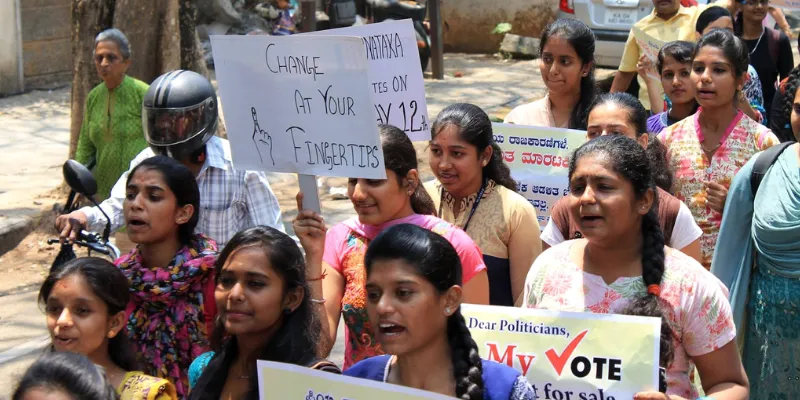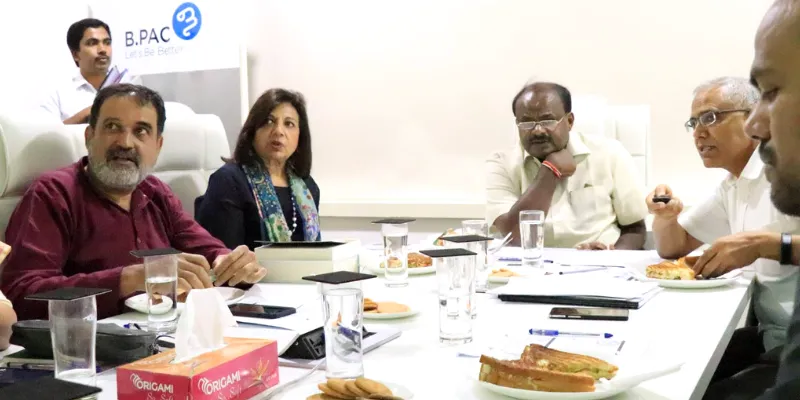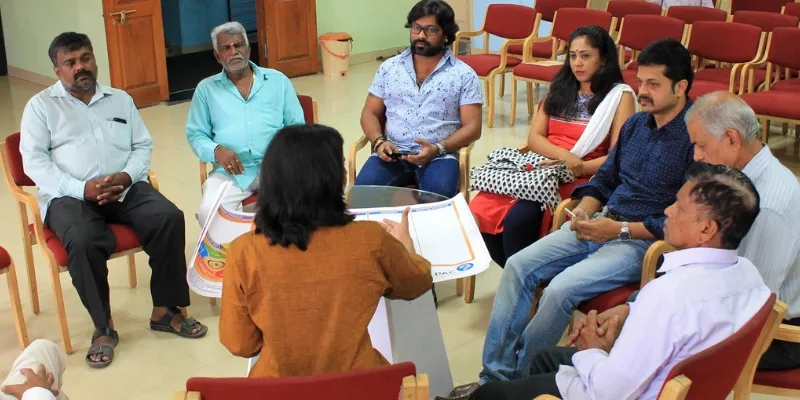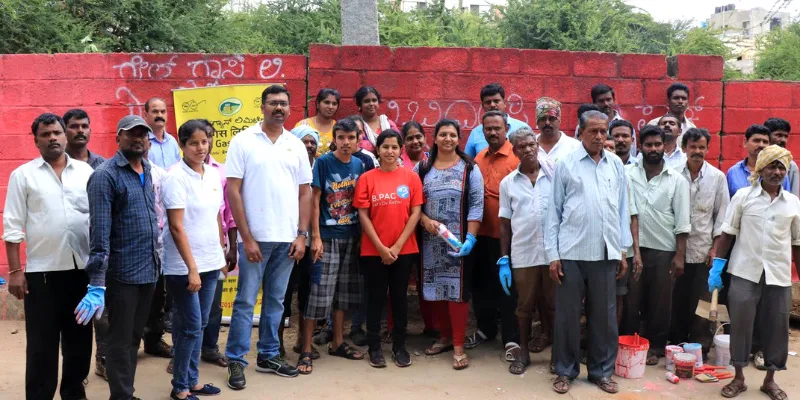WhatsApp, street action, and incubation for citizen engagement: how BPAC is empowering Bengaluru residents to become problem solvers
Bengaluru residents have always vociferously fought for better government response and action. Revathy Ashok, of Bengaluru Political Action Committee (BPAC), tells us how continued citizen engagement is crucial to ensure a cleaner, safer, and better city.

Every citizen wants leaders to engage with them in a transparent and organised manner, leading to more collective and collaborative action, and brainstorming. For this, an ongoing public-government partnership is needed to find a solution to the multiple civic issues in any city or town.
But this is easier said than done. That's because, despite the demand for a more hands-on government and municipal corporation, rarely do metropolitan cities witness large-scale or sustained citizen engagement alongside governance.
However, Bengaluru has, over the years, witnessed a lot of traction on the public participation front. We saw it during the silent public protest against the state government’s proposal to construct a steel flyover in the city--which would result in the felling of over 1,000 trees -- or the citizen's thrust to rejuvenate lakes, and participation in waste management projects. The city has been actively voicing its demands to the government while taking on the civic duty of collaborating to arrive at solutions.

Bengaluru Political Action Committee (BPAC) stands out as an example of how public consciousness can be tapped to address pressing civic concerns. An active organisation instrumental in creating a cadre of local civic leaders, it has not only engaged with the public but also acts as a bridge between local authorities and residents of Bengaluru.
Founded by a group of Bengalureans, including prominent faces like Kiran Mazumdar Shaw and TV Mohandas Pai, the non-partisan citizens' group aims to improve governance in the city.
In an interaction with SocialStory, Revathy Ashok, Managing Trustee, and CEO of BPAC, explained how residents can be mobilised and engaged on the ground to create a participative governance model and build a better city.
Edited excerpts of the interview:
SocialStory: Why is it important for citizens, be it an entrepreneur, an auto driver or a college student, to engage with city governance and civic problems?
Revathy Ashok: We all have to believe that this is not the ‘ruler and the ruled’ model. The government is appointed by us; we have voted for them, and it is our responsibility to ensure that they are on the right path. It is important that we demand what is required of them. Meanwhile, we as citizens have to do our bit as well.
To think that somehow the government is magically going to solve all our problems while the citizens remain disengaged is not going to work.
Civilian engagement is important because in any society you have pulls and pushes. You will never have solutions acceptable to all. If you will not engage, democracy will still be alive, but somebody else’s voice will take precedence. If you want your voice to be heard, you have to use all the tools of democracy available to you.

SS: But often, there is a ‘it’s not my problem, it's yours’ attitude among urban city dwellers. How do we deal with this?
RA: Quite often when I meet people they tell me, ‘I have this problem in my area, can you guys come here and do something about it?’ I tell them that this is not about me trying to clean the whole city. I tell them that you have to own your part of the city, be it your workplace, home, or where your children go to school. Let people own pieces of the city where they live and interact. We come here, we extract what we need from the city, we get our jobs, we get our homes, but we are not ready to give back. This must change.
SS: Are we now moving towards arriving at collective solutions for problems?
RA: Yes, because as an individual you feel very helpless when you have to deal with these huge institutions that are masters at pushing you off. But when you are a collective it becomes much more easy to push for your agenda. And WhatsApp has been a very handy tool. I don't think any other country is using WhatsApp so effectively to deal with the government and the politicians.

SS: It is easy to be an armchair activist and talk about the problems faced by the city on social media. But how do we move from social media to on-ground engagement?
RA: I get abused on Twitter a number of times. They say that you have done this wrong, you have not done this right, or these are the several problems that have been overlooked. I respond by saying that BPAC is an open, welcome space, and that anybody who is commenting and feels strongly about something should come by our office, and we will be happy to work together because this is a citizens’ movement. This is open to everybody to engage. Let's work together to find common solutions.
But rarely do we find people who are very vocal on Twitter actually coming back and saying, ‘I will work with you’.
SS: But BPAC has worked on the ground and managed to mobilise people. How did this happen? What are the tools to ensure that citizens care enough to move beyond the comfort of their homes and to the streets to create an impact?
RA: Five years ago, we had a discussion about how we are complaining about a lot of issues that are plaguing the city, whether it is garbage or safety. The government or the politician is not throwing garbage on the road. It is the people who are doing it. So unless there is a conscious thought among citizens to change our behaviour, these problems are not going to go away. The government can come and do some cleanup, but our behaviour after that will ensure whether the cleanliness is sustained or not.
BPAC has created a cadre of problem solvers who will go out and fix problems. And one of the ways in which we can do this is by creating a political incubator.
We found that most of the city's problems lie at the lowest tier of governance (corporation’s ward level) --felled trees, broken water lines, leaking sewage lines, garbage on the streets, potholes on the roads, lack of footpaths, etc.

So we decided to fix the ward requirements, and that was the genesis of the political incubator, BCLIP, the B.PAC Civic Leadership Incubator Programme. We are currently running the sixth batch, and 270 students have graduated so far. It is a very rigorous programme requiring 100 recommendations of people from within your ward. This endorsement is important because this is a free nine-month programme.
We want to make sure that we are spending money wisely on people who actually work to improve the situation at the ward level. I am happy to say that of the 198 wards in Bengaluru City, today, over 110 wards have BCLIP leaders working actively. Our goal is to cover all the wards soon.
This programme helps us to have a collective vision of shared knowledge and resources for citizens to work in their respective areas, and we can support them through knowledge sessions, seminars, and connections.
ALSO READ: This Voters’ Day, let’s say goodbye to urban apathy and make every vote count
SS: Over the years, how has citizen engagement in Bengaluru grown?
RA: I think Bengaluru has always had a culture of being very involved, with residents often giving voice to their opinions. It has a unique culture where you can criticise the government of the day, and yet when you seek a meeting and want to put forth another view, there is the openness to have that discussion.
This is not the case everywhere. In other states, you can’t criticise the government and go back and have a conversation with the political leaders. This is a unique culture that we must recognise, cherish, and preserve. This is not with any particular political party but across political parties.
ALSO READ: How Bengaluru-based Durga is empowering women to fight rape and sexual harassment







